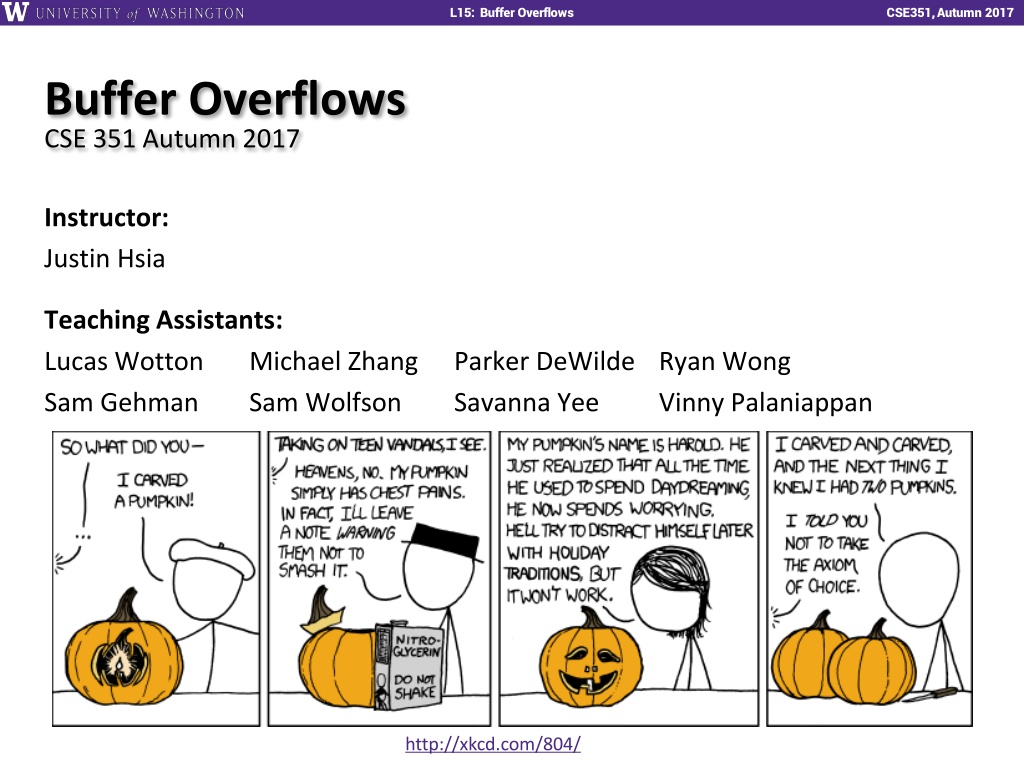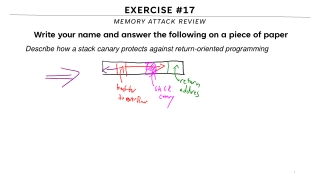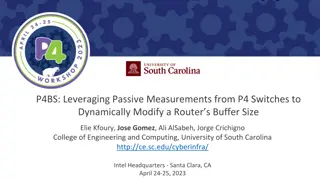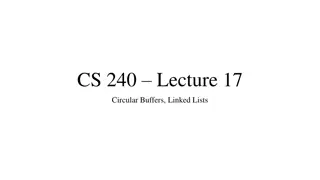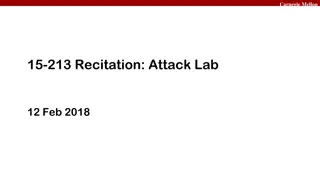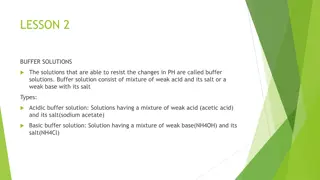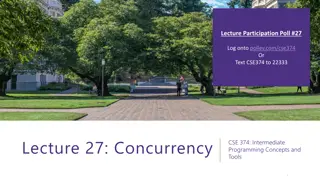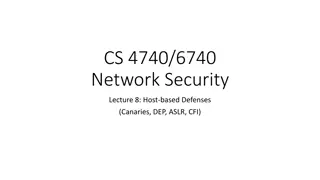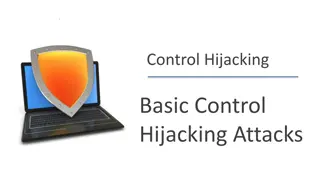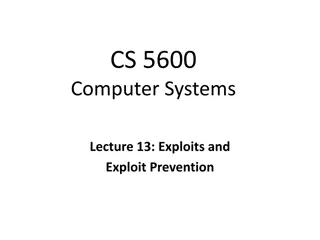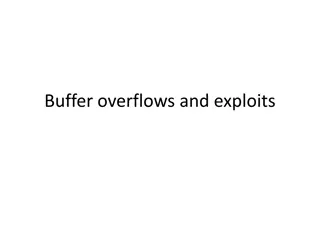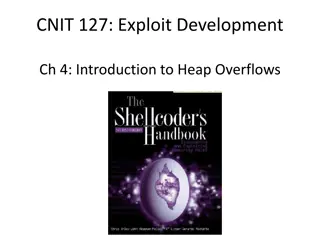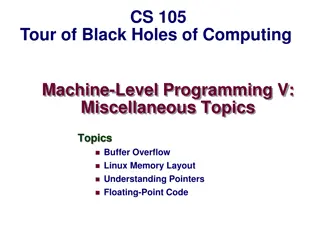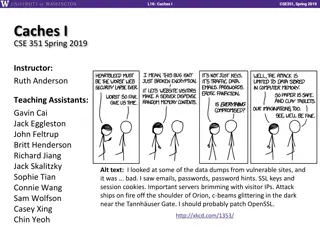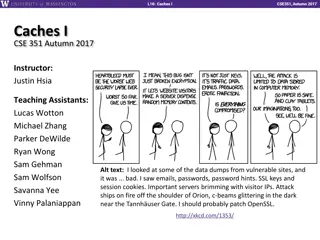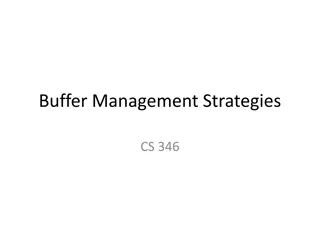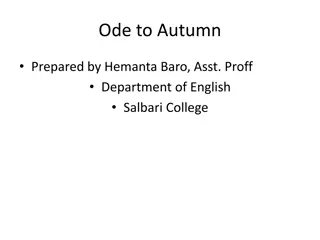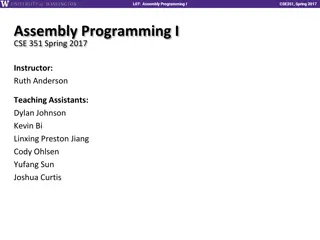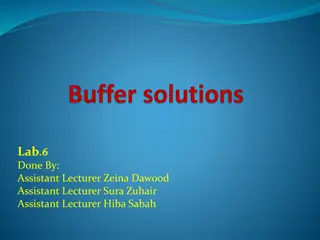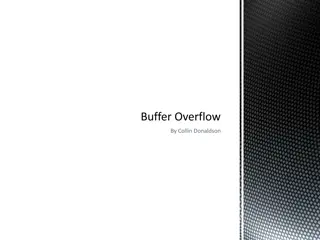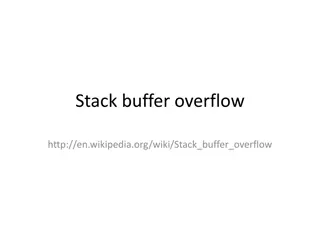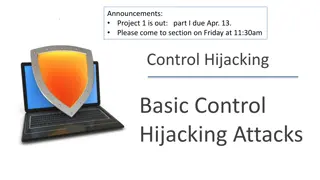Buffer Overflows in CSE351 Autumn 2017
Explore buffer overflows in CSE351 Autumn 2017, covering topics like memory layout, stack, heap, and defenses against buffer overflows. Learn about important concepts such as input buffers, code injection, and memory allocation examples, with insights into x86-64 Linux memory layout.
Download Presentation

Please find below an Image/Link to download the presentation.
The content on the website is provided AS IS for your information and personal use only. It may not be sold, licensed, or shared on other websites without obtaining consent from the author.If you encounter any issues during the download, it is possible that the publisher has removed the file from their server.
You are allowed to download the files provided on this website for personal or commercial use, subject to the condition that they are used lawfully. All files are the property of their respective owners.
The content on the website is provided AS IS for your information and personal use only. It may not be sold, licensed, or shared on other websites without obtaining consent from the author.
E N D
Presentation Transcript
L15: Buffer Overflows CSE351, Autumn 2017 Buffer Overflows CSE 351 Autumn 2017 Instructor: Justin Hsia Teaching Assistants: Lucas Wotton Sam Gehman Michael Zhang Sam Wolfson Parker DeWilde Ryan Wong Savanna Yee Vinny Palaniappan http://xkcd.com/804/
L15: Buffer Overflows CSE351, Autumn 2017 Administrivia Mid-quarter survey due tomorrow (11/2) Homework 3 due Friday (11/3) Lab 3 released today, due next Thursday (11/9) Midterm grades (out of 50) to be released by Saturday Solutions posted on website Rubric and grades will be found on Gradescope Regrade requests will be open for a short time after grade release 2
L15: Buffer Overflows CSE351, Autumn 2017 Buffer Overflows Address space layout (more details!) Input buffers on the stack Overflowing buffers and injecting code Defenses against buffer overflows 3
L15: Buffer Overflows CSE351, Autumn 2017 not drawn to scale Review: General Memory Layout 2N-1 Stack Local variables (procedure context) Stack Heap Dynamically allocated as needed malloc(), calloc(), new, Heap Statically allocated Data Read/write: global variables (Static Data) Read-only: string literals (Literals) Static Data Literals Code/Instructions Executable machine instructions Read-only Instructions 0 4
L15: Buffer Overflows CSE351, Autumn 2017 not drawn to scale x86-64 Linux Memory Layout 0x00007FFFFFFFFFFF Stack Stack Runtime stack has 8 MiB limit Heap Dynamically allocated as needed malloc(), calloc(), new, Heap Shared Libraries Statically allocated data (Data) Read-only: string literals Read/write: global arrays and variables Code / Shared Libraries Executable machine instructions Read-only Heap Data Instructions 0x400000 Hex Address 0x000000 5
L15: Buffer Overflows CSE351, Autumn 2017 not drawn to scale Memory Allocation Example Stack char big_array[1L<<24]; /* 16 MB */ char huge_array[1L<<31]; /* 2 GB */ int global = 0; Heap int useless() { return 0; } int main() { void *p1, *p2, *p3, *p4; int local = 0; p1 = malloc(1L << 28); /* 256 MB */ p2 = malloc(1L << 8); /* 256 B */ p3 = malloc(1L << 32); /* 4 GB */ p4 = malloc(1L << 8); /* 256 B */ /* Some print statements ... */ } Shared Libraries Heap Data Instructions Where does everything go? 6
L15: Buffer Overflows CSE351, Autumn 2017 not drawn to scale Memory Allocation Example Stack char big_array[1L<<24]; /* 16 MB */ char huge_array[1L<<31]; /* 2 GB */ int global = 0; Heap int useless() { return 0; } int main() { void *p1, *p2, *p3, *p4; int local = 0; p1 = malloc(1L << 28); /* 256 MB */ p2 = malloc(1L << 8); /* 256 B */ p3 = malloc(1L << 32); /* 4 GB */ p4 = malloc(1L << 8); /* 256 B */ /* Some print statements ... */ } Shared Libraries Heap Data Instructions Where does everything go? 7
L15: Buffer Overflows CSE351, Autumn 2017 Reminder: x86-64/Linux Stack Frame Higher Addresses Caller s Stack Frame Arguments (if > 6 args) for this call Caller Frame Current/ Callee Stack Frame Return address Pushed by call instruction Old frame pointer (optional) Saved register context (when reusing registers) Local variables (if can t be kept in registers) Argument build area (If callee needs to call another function -parameters for function about to call, if needed) Arguments 7+ Return Addr Old %rbp Frame pointer %rbp (Optional) Saved Registers + Local Variables Argument Build (Optional) Lower Addresses Stack pointer %rsp 8
L15: Buffer Overflows CSE351, Autumn 2017 Buffer Overflow in a Nutshell Characteristics of the traditional Linux memory layout provide opportunities for malicious programs Stack grows backwards in memory Data and instructions both stored in the same memory C does not check array bounds Many Unix/Linux/C functions don t check argument sizes Allows overflowing (writing past the end) of buffers (arrays) 9
L15: Buffer Overflows CSE351, Autumn 2017 Buffer Overflow in a Nutshell Buffer overflows on the stack can overwrite interesting data Attackers just choose the right inputs Simplest form (sometimes called stack smashing ) Unchecked length on string input into bounded array causes overwriting of stack data Try to change the return address of the current procedure Why is this a big deal? It is (was?) the #1 technical cause of security vulnerabilities #1 overall cause is social engineering / user ignorance 10
L15: Buffer Overflows CSE351, Autumn 2017 String Library Code Implementation of Unix function gets() /* Get string from stdin */ char* gets(char* dest) { int c = getchar(); char* p = dest; while (c != EOF && c != '\n') { *p++ = c; c = getchar(); } *p = '\0'; return dest; } pointer to start of an array same as: *p = c; p++; What could go wrong in this code? 11
L15: Buffer Overflows CSE351, Autumn 2017 String Library Code Implementation of Unix function gets() /* Get string from stdin */ char* gets(char* dest) { int c = getchar(); char* p = dest; while (c != EOF && c != '\n') { *p++ = c; c = getchar(); } *p = '\0'; return dest; } No way to specify limit on number of characters to read Similar problems with other Unix functions: strcpy: Copies string of arbitrary length to a dst scanf, fscanf, sscanf,when given %s specifier 12
L15: Buffer Overflows CSE351, Autumn 2017 Vulnerable Buffer Code /* Echo Line */ void echo() { char buf[8]; /* Way too small! */ gets(buf); puts(buf); } void call_echo() { echo(); } unix> ./buf-nsp Enter string: 12345678901234567890123 12345678901234567890123 unix> ./buf-nsp Enter string: 123456789012345678901234 Segmentation Fault 13
L15: Buffer Overflows CSE351, Autumn 2017 Buffer Overflow Disassembly (buf-nsp) echo: 00000000004005c6 <echo>: 4005c6: 48 83 ec 18 sub $0x18,%rsp ... ... calls printf ... 4005d9: 48 89 e7 mov %rsp,%rdi 4005dc: e8 dd fe ff ff callq 4004c0 <gets@plt> 4005e1: 48 89 e7 mov %rsp,%rdi 4005e4: e8 95 fe ff ff callq 400480 <puts@plt> 4005e9: 48 83 c4 18 add $0x18,%rsp 4005ed: c3 retq call_echo: 00000000004005ee <call_echo>: 4005ee: 48 83 ec 08 sub $0x8,%rsp 4005f2: b8 00 00 00 00 mov $0x0,%eax 4005f7: e8 ca ff ff ff callq 4005c6 <echo> 4005fc: 48 83 c4 08 add $0x8,%rsp 400600: c3 retq return address 14
L15: Buffer Overflows CSE351, Autumn 2017 Buffer Overflow Stack Before call to gets /* Echo Line */ void echo() { char buf[8]; /* Way too small! */ gets(buf); puts(buf); } Stack frame for call_echo Return address (8 bytes) echo: subq $24, %rsp ... movq %rsp, %rdi call gets ... 16 bytes unused [7] [6] [5] [4] [3] [2] [1] [0]buf %rsp Note: addresses increasing right-to-left, bottom-to-top 15
L15: Buffer Overflows CSE351, Autumn 2017 Buffer Overflow Example Before call to gets void echo() { char buf[8]; gets(buf); . . . } echo: subq $24, %rsp ... movq %rsp, %rdi call gets ... Stack frame for call_echo 00 00 00 00 00 40 05 fc call_echo: . . . 4005f7: callq 4005c6 <echo> 4005fc: add $0x8,%rsp . . . 16 bytes unused [7] [6] [5] [4] buf %rsp [3] [2] [1] [0] 16
L15: Buffer Overflows CSE351, Autumn 2017 Buffer Overflow Example #1 After call to gets void echo() { char buf[8]; gets(buf); . . . } echo: subq $24, %rsp ... movq %rsp, %rdi call gets ... Stack frame for call_echo 00 00 00 00 00 40 05 fc 00 33 32 31 30 39 38 37 36 35 34 33 32 31 30 39 38 37 36 35 34 33 32 31 call_echo: . . . 4005f7: callq 4005c6 <echo> 4005fc: add $0x8,%rsp . . . buf %rsp unix> ./buf-nsp Enter string: 12345678901234567890123 12345678901234567890123 Note:Digit ? is just 0x3? in ASCII! Overflowed buffer, but did not corrupt state 17
L15: Buffer Overflows CSE351, Autumn 2017 Buffer Overflow Example #2 After call to gets void echo() { char buf[8]; gets(buf); . . . } echo: subq $24, %rsp ... movq %rsp, %rdi call gets ... Stack frame for call_echo 00 00 00 00 00 40 05 00 34 33 32 31 30 39 38 37 36 35 34 33 32 31 30 39 38 37 36 35 34 33 32 31 call_echo: . . . 4005f7: callq 4005c8 <echo> 4005fc: add $0x8,%rsp . . . buf %rsp unix>./buf-nsp Enter string: 123456789012345678901234 Segmentation Fault Overflowed buffer and corrupted return pointer 18
L15: Buffer Overflows CSE351, Autumn 2017 Buffer Overflow Example #2 Explained After return from echo 0000000000400500 <deregister_tm_clones>: 400500: mov $0x60104f,%eax 400505: push %rbp 400506: sub $0x601048,%rax 40050c: cmp $0xe,%rax 400510: mov %rsp,%rbp 400513: jbe 400530 400515: mov $0x0,%eax 40051a: test %rax,%rax 40051d: je 400530 40051f: pop %rbp 400520: mov $0x601048,%edi 400525: jmpq *%rax 400527: nopw 0x0(%rax,%rax,1) 40052e: nop 400530: pop %rbp 400531: retq Stack frame for call_echo %rsp 00 00 00 00 00 40 05 00 34 33 32 31 30 39 38 37 36 35 34 33 32 31 30 39 38 37 36 35 34 33 32 31 buf Returns to unrelated code, but continues! Eventually segfaults on retq of deregister_tm_clones. 19
L15: Buffer Overflows CSE351, Autumn 2017 Malicious Use of Buffer Overflow: Code Injection Attacks Stack after call to gets() High Addresses void foo(){ bar(); A:... } foo stack frame return address A A (return address) A B int bar() { char buf[64]; gets(buf); ... return ...; } data written by gets() pad bar stack frame exploit code buf starts here B Low Addresses Input string contains byte representation of executable code Overwrite return address A with address of buffer B When bar() executes ret, will jump to exploit code 20
L15: Buffer Overflows CSE351, Autumn 2017 Peer Instruction Question smash_me is vulnerable to stack smashing! What is the minimum number of characters that gets must read in order for us to change the return address to a stack address (in Linux)? Vote at http://PollEv.com/justinh A. 33 B. 36 C. 51 D. 54 E. We re lost Previous stack frame smash_me: subq $0x30, %rsp ... movq %rsp, %rdi call gets ... 00 00 00 00 00 40 05 fc . . . [0] 21
L15: Buffer Overflows CSE351, Autumn 2017 Exploits Based on Buffer Overflows Buffer overflow bugs can allow remote machines to execute arbitrary code on victim machines Distressingly common in real programs Programmers keep making the same mistakes Recent measures make these attacks much more difficult Examples across the decades Original Internet worm (1988) Still happens!! Heartbleed (2014, affected 17% of servers) Cloudbleed (2017) Fun: Nintendo hacks Using glitches to rewrite code: https://www.youtube.com/watch?v=TqK-2jUQBUY FlappyBird in Mario: https://www.youtube.com/watch?v=hB6eY73sLV0 22
L15: Buffer Overflows CSE351, Autumn 2017 Example: the original Internet worm (1988) Exploited a few vulnerabilities to spread Early versions of the finger server (fingerd) used gets() to read the argument sent by the client: finger droh@cs.cmu.edu Worm attacked fingerd server with phony argument: finger exploit-codepaddingnew-return-addr Exploit code: executed a root shell on the victim machine with a direct TCP connection to the attacker Scanned for other machines to attack Invaded ~6000 computers in hours (10% of the Internet) see June 1989 article in Comm. of the ACM The young author of the worm was prosecuted 23
L15: Buffer Overflows CSE351, Autumn 2017 Heartbleed (2014) Buffer over-read in OpenSSL Open source security library Bug in a small range of versions Heartbeat packet Specifies length of message Server echoes it back Library just trusted this length Allowed attackers to read contents of memory anywhere they wanted Est. 17% of Internet affected Catastrophic Github, Yahoo, Stack Overflow, Amazon AWS, ... By FenixFeather - Own work, CC BY-SA 3.0, https://commons.wikimedia.org/w/index.php?curid=32276981 24
L15: Buffer Overflows CSE351, Autumn 2017 Dealing with buffer overflow attacks 1) Avoid overflow vulnerabilities 2) Employ system-level protections 3) Have compiler use stack canaries 25
L15: Buffer Overflows CSE351, Autumn 2017 1) Avoid Overflow Vulnerabilities in Code /* Echo Line */ void echo() { char buf[8]; /* Way too small! */ fgets(buf, 8, stdin); puts(buf); } Use library routines that limit string lengths fgets instead of gets(2nd argument to fgets sets limit) strncpy instead of strcpy Don t use scanf with %s conversion specification Use fgets to read the string Or use %nswhere n is a suitable integer 26
L15: Buffer Overflows CSE351, Autumn 2017 2) System-Level Protections High Addresses Randomized stack offsets At start of program, allocate random amount of space on stack Shifts stack addresses for entire program Random allocation main s stack frame Addresses will vary from one run to another Makes it difficult for hacker to predict beginning of inserted code Other functions stack frames Example: Code from Slide 6 executed 5 times; address of variable local = 0x7ffd19d3f8ac 0x7ffe8a462c2c 0x7ffe927c905c 0x7ffefd5c27dc 0x7fffa0175afc Stack repositioned each time program executes B? pad exploit code B? Low Addresses 27
L15: Buffer Overflows CSE351, Autumn 2017 2) System-Level Protections Stack after call to gets() Non-executable code segments In traditional x86, can mark region of memory as either read-only or writeable foo stack frame Can execute anything readable x86-64 added explicit execute permission Stack marked as non-executable B bar stack frame pad data written by gets() Do NOT execute code in Stack, Static Data, or Heap regions exploit code Hardware support needed B Any attempt to execute this code will fail 28
L15: Buffer Overflows CSE351, Autumn 2017 3) Stack Canaries Basic Idea: place special value ( canary ) on stack just beyond buffer Secret value known only to compiler After buffer but before return address Check for corruption before exiting function GCC implementation (now default) -fstack-protector Code back on Slide 14 (buf-nsp) compiled with fno-stack-protector flag unix>./buf Enter string: 12345678 12345678 unix> ./buf Enter string: 123456789 *** stack smashing detected *** 29
L15: Buffer Overflows CSE351, Autumn 2017 Protected Buffer Disassembly (buf) echo: 400638: sub $0x18,%rsp 40063c: mov %fs:0x28,%rax 400645: mov %rax,0x8(%rsp) 40064a: xor %eax,%eax ... ... call printf ... 400656: mov %rsp,%rdi 400659: callq 400530 <gets@plt> 40065e: mov %rsp,%rdi 400661: callq 4004e0 <puts@plt> 400666: mov 0x8(%rsp),%rax 40066b: xor %fs:0x28,%rax 400674: je 40067b <echo+0x43> 400676: callq 4004f0 <__stack_chk_fail@plt> 40067b: add $0x18,%rsp 40067f: retq 30
L15: Buffer Overflows CSE351, Autumn 2017 Setting Up Canary Before call to gets /* Echo Line */ void echo() { char buf[8]; /* Way too small! */ gets(buf); puts(buf); } Stack frame for call_echo Return address (8 bytes) Segment register (don t worry about it) echo: . . . movq movq xorl . . . %fs:40, %rax # Get canary %rax, 8(%rsp) # Place on stack %eax, %eax # Erase canary Canary (8 bytes) [7] [6] [5] [4] buf %rsp [3] [2] [1] [0] 31
L15: Buffer Overflows CSE351, Autumn 2017 Checking Canary After call to gets /* Echo Line */ void echo() { char buf[8]; /* Way too small! */ gets(buf); puts(buf); } Stack frame for call_echo Return address (8 bytes) echo: .L6: buf %rsp . . . movq xorq je call 8(%rsp), %rax # retrieve from Stack %fs:40, %rax # compare to canary .L2 # if same, OK __stack_chk_fail # else, FAIL . . . Canary (8 bytes) 00 37 36 35 34 33 32 31 Input: 1234567 32
L15: Buffer Overflows CSE351, Autumn 2017 Summary 1) Avoid overflow vulnerabilities Use library routines that limit string lengths 2) Employ system-level protections Randomized Stack offsets Code on the Stack is not executable 3) Have compiler use stack canaries 33
